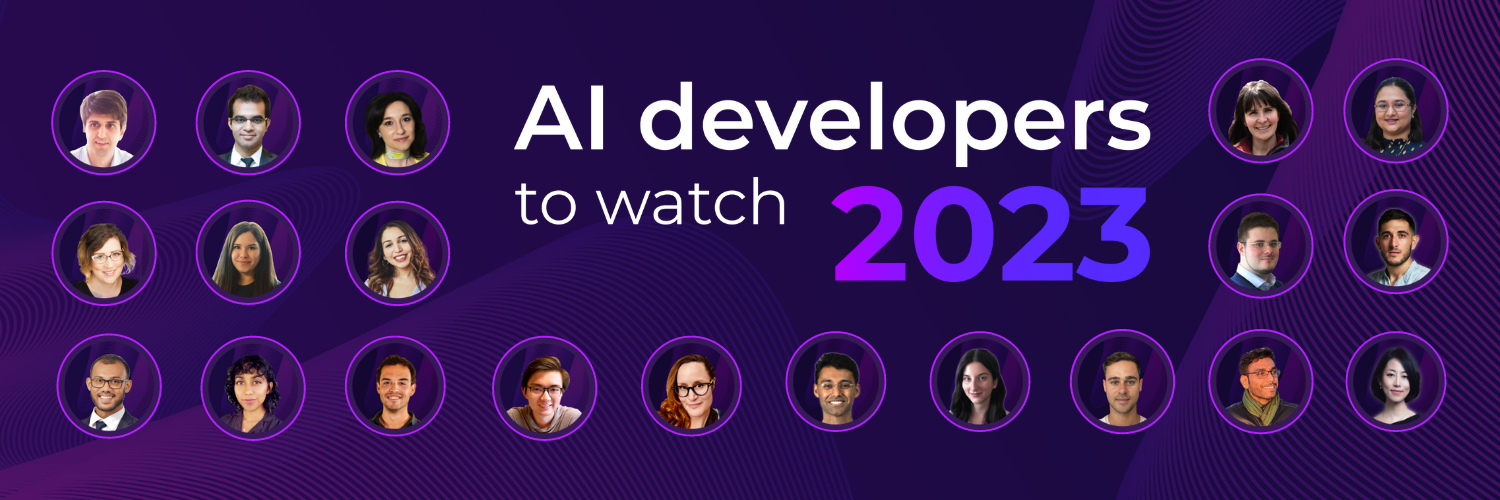
2022 has been a breakthrough year for AI. Despite difficult times for the technology sector, AI is evolving, advancing, and flourishing. ML insider, cnvrg.io’s annual survey on the state of machine learning has found that 89% of organizations are seeing the benefits of their AI solutions in 2022.
Behind the AI achievements stand equally impressive and intelligent humans. AI Developers are the drivers for successful AI, creating change and pushing the boundaries of AI technology. Thanks to these individuals, AI in 2022 has grown and improved, becoming more accessible, covering a wide variety of use cases and solving real-world problems.
The AI developers to watch in 2023 list puts the spotlight on the humans that have greatly contributed to the advancement of AI and are committed to moving AI forward in 2023. We asked these AI innovators and leaders what it takes to be successful in AI, and how they see AI evolving in the next 5 years.

Irene Solaiman
Policy Director, Hugging Face
〝I expect two avenues of progress: incredible leaps in capability innovation and the increasing urgency to evaluate and mitigate AI harms.〞
In your opinion, what does it take to be successful in AI?
Collaborating with experts across fields better informs holistic approaches to both AI development and to safety and social impact work. My personal mission is to improve AI for peoples most often marginalized or overlooked. In addition to researching technical methods to mitigate societal harms from applied AI systems, such as harmful biases against protected classes, I shape proactive policies to standardize and steer AI development for public interest. This requires computer science skills and programming knowledge, deep familiarity with policy frameworks for AI, and robust understanding of the complex social ecosystem in which we develop and deploy AI systems. Interdisciplinary skills are key.
How do you see AI evolving in the next 5 years?
I expect two avenues of progress: incredible leaps in capability innovation and the increasing urgency to evaluate and mitigate AI harms. I’m eager for those two avenues to merge; AI risks must be evaluated and addressed through all stages of development. The critical considerations that should be examined from project proposal to deployment include harmful biases, disparate performance, and misuse. Since I’m most familiar with generative AI systems which are considered “general purpose”, I hope there will be and am working to make more tools to measure AI behavior. We must ensure AI enhances and does not overwrite societies and cultures.

Petar Veličković
Staff Research Scientist, DeepMind
〝It’s never too late to join in on the action – so long as you are highly motivated to stay on top of the field.〞
In your opinion, what does it take to be successful in AI?
Success in AI requires, primarily, tenacity in my opinion. It’s truly a field with one of the easiest ‘barriers of entry’, and it’s never too late to join in on the action — so long as you are highly motivated to stay on top of the field. I speak from experience: when I started my PhD in machine learning, I had _zero_ experience of modern deep learning methods. In fact, I spent the first few months of this PhD taking a Udacity course to learn TensorFlow! Not long later, I was making published research contributions in computer vision, and not long after that, I got admitted to a visiting position at Montréal’s prestigious Mila institute, where I published my top-cited paper on graph attention networks. A little perseverance, coupled with a decent grounding in linear algebra and probability, can truly go a long way.
How do you see AI evolving in the next 5 years?
I imagine that the next 5 years will see a very strong push towards achieving artificial general intelligence (AGI) and the plethora of amazing products and scientific discoveries that AGI will enable. Specifically, I expect a ‘synergistic’ union of our existing state-of-the-art perceptual models, with the rapid development of models for robustifying neural reasoning.

Alessandra Sala
Sr. Director of AI and Data Science at Shutterstock
Global President of Women in AI
〝The participation of women and minorities in the design and development of these systems is paramount to achieve equitable outcome for everyone.〞
In your opinion, what does it take to be successful in AI?
Success in AI, for me, means building AI Systems that deliver value and equitable outcomes. AI powered systems requires a multilateral approach: 1. deep technical knowledge to understand the fundamental limits and assumptions built in AI models; 2. strong AI engineering practices for production deployment which requires a different lifecycle to traditional software; 3. Ethical and Responsible AI practices to audit the AI system, its assumptions and the data used for training.
How do you see AI evolving in the next 5 years?
Our lives and decisions are intrinsically influenced by the outcomes of AI today and even more over the 5 years. AI is disrupting every industry such as transport, medicine, agriculture and many more. The participation of women and minorities in the design and development of future AI systems is paramount to achieve equitable outcomes for everyone.

Leonardo Neves
Manager, Applied Research, Grammarly
〝As more people have access to this technology and can better understand how models make their decisions, AI will be used in even more use cases and creative ways.〞
In your opinion, what does it take to be successful in AI?
Being successful in AI requires being curious and able to adapt. The algorithms and tools I used in graduate school are already outdated. I had to constantly read and learn new things throughout my career, and not only topics related to my core area of research — Natural Language Processing — but also several other areas like Computer Vision, Graph Neural Networks, and even Psychology! A good mix of breadth and depth is encouraged if you are looking for a career in AI. Many ideas transcend a specific area of expertise and can help you be creative as you solve your problems.
How do you see AI evolving in the next 5 years?
AI development will continue to push the boundaries for how large models can get, but we will see a shift towards more efficient and explainable models in the next five years. With more efficient models, more researchers outside the most well-funded labs and companies will be able to contribute to the advances of AI in a meaningful way. As more people have access to this technology and can better understand how models make their decisions, AI will be used in even more use cases and creative ways.

Laura Edell
Chief Data Scientist, Microsoft
〝It is important to speak in terms of the business outcomes you are trying to achieve through using AI〞
In your opinion, what does it take to be successful in AI?
To be successful in AI, it is important to speak in terms of the business outcomes you are trying to achieve through using AI, rather than using PhD-level language that only a small group of people will understand.
How do you see AI evolving in the next 5 years?
In the next 5 years we will see that AI will become more and more embedded into business processes and more ubiquitous like formulas are to excel.

Murilo Gustineli
Data Scientist, Insight
〝Implementing machine learning is first and foremost a software endeavour, and requires experience building well architected, reliable, easy to deploy software〞
In your opinion, what does it take to be successful in AI?
The field of AI and machine learning is constantly changing in a fast pace. On a personal level, it is important to have a strong foundation in mathematics, computer science, and statistics. Being curious and willing to learn is essential to stay relevant in the field. Having passion for learning, perseverance at a certain task, and creating purposeful activities will take someone to the top of their field. My advice is to keep learning and have fun! Companies should prioritize engineering. Implementing machine learning is first and foremost a software endeavour, and requires experience building well architected, reliable, easy to deploy software. Also, prioritize time spent on data quality over model tuning. More efforts should be spent on getting more relevant input data, and preprocessing the data in a better way. Choosing the right algorithm and tuning it correctly is the last step, the cherry on top of the cake.
How do you see AI evolving in the next 5 years?
It is challenging to foresee the advancements that will occur in the field of AI over the next five years as it is constantly evolving. However, it is likely that significant progress will be made in several areas in the near future. Natural language processing, machine learning, robotics, healthcare, and various industries are being significantly impacted by AI applications. This could enable AI systems to perform tasks more efficiently and autonomously, facilitate more natural communication between humans and machines, lead to the development of more advanced robotics, improve patient outcomes and make healthcare more efficient. The AI field currently has a model-centric approach, where new and larger models are developed and released regularly, slightly improving accuracy compared to state-of-the-art models. However, a data-centric approach led by Andrew Ng, which focuses on improving the quality of data rather than the model itself, is gaining popularity. This approach involves using data to measure a model’s success, analyzing errors in the data to improve the model, and monitoring incoming data and the model’s performance on it. I believe that the industry will soon increase its adoption of the data-centric approach. Moreover, Reinforcement Learning (RL) is making big advancements in the research field, such as DeepMind’s AlphaTensor that learned a faster way to perform matrix multiplication. RL based-models are already present in the industry. However, I’m hoping the industry will start adopting RL in a bigger scale in the upcoming years.

Nermeen Louizi Ghoniem
AI Engineer, Jabra
〝AI has tremendous potential for good, which we absolutely must harness in the next 5 years and forward〞
In your opinion, what does it take to be successful in AI?
AI models are highly complex systems — they are designed, developed, and deployed in complex environments by many different stakeholders. This means that there is a lot of room for error and misuse. A successful AI developer is, therefore, eager to contribute and yearning to learn more but also understands the complexity of modern society and understands the value of collaboration – a true hybrid that can balance even the most complex situations and always has an eye for the bigger picture.
Likewise, I believe it is crucial for anyone working with AI to be comfortable with the unknown and failures, in general as AI as a field embodies the following saying: “the path to success is paved with (accelerated) failures”. Relatedly, I’d like to give the example of the Golden Gate bridge, situated in San Francisco at the outskirts of Silicon Valley. This bridge was called the impossible bridge for a decade by engineers. And funnily enough, the impossible bridge was not so impossible to build after all. Just like AI developement, it required a lot of planning and the right (perseverant) heads on the problem.
How do you see AI evolving in the next 5 years?
AI has tremendous potential for good, which we absolutely must harness in the next 5 years and forward. From self-driving cars and AI-powered robotics to music recommendation apps and the recent rise of AI artists, AI is shaking up business as usual and will definitely continue to do so in the next 5 years. However, unless we change the way we think and talk about AI, AI can and will divide our society. It’s not a question of if but when.
We need to change the mindset and attitude engineers have when engaging and developing AI. What I mean here is I’d like to please ask engineers, including myself, to acknowledge that yes, we have biases. And, that how these algorithms are going to look at any group of people and their role in society, it mainly comes from their creators – which is us. AI cannot be naturally fair or for example, gender-neutral, and engineers should not think about these issues as something divorced from their own role. And associated with that is encouraging more fact-based conversations about how all of this works. We need to stop hyping up the field, as we are only clouding laypersons’ understanding of the field. This is pivotal as I earnestly believe AI and technology as a whole can help bridge the digital divide and create an inclusive society, if not within the next 5 years, then within the next 10 years. To empower and educate people, we need to reveal and make more transparent how these analyses are being done and how to interpret some of the outcomes and decisions. We need to involve all of us in shaping the future of technology and our digital society.

Massimo Belloni
Data Science Manager, Bumble Inc.
〝We will finally notice a good understanding of what AI/ML “actually” is, with successful ML deployments at company at every scale〞
In your opinion, what does it take to be successful in AI?
A good mix of patience and pragmatism: the former, to be able to deal with the long and (possibly!) boring phases around dataset cleaning, feature collection and processes understanding; the latter, in order to be able to deploy to production as soon as possible with the best and quickest stack available to prove value to the business right from the first steps!
How do you see AI evolving in the next 5 years?
If in one direction we will keep seeing successful breakthrough in research pushing the boundaries of what possible (eg. diffusion models and generative AI art, AlphaFold, ChatGPT), in another we will finally notice a good understanding of what AI/ML “actually” is, with successful ML deployments at company at every scale (also thanks to MLOps nowadays being largely commoditised by big cloud vendors!) to improve specific challenges they are facing and making their operations more efficient.

Jonathan Jin
Senior ML Engineer, Spotify
〝It’s not all simply about benchmarks or speed or models with ever-increasing numbers of parameters, but rather about the impacts of such systems to the humans that use them〞
In your opinion, what does it take to be successful in AI?
In the short amount of time that I’ve been working in it, AI has evolved at such a fascinating, relentless—and at times frightening—pace. I think working in AI really benefits from curiosity and a thirst for multi-disciplinary learning. But more importantly, one needs to be willing to acknowledge and reckon with the very human costs of this innovation. It’s not just about building ever bigger and more powerful models. One really needs to recognize and remain cognizant of the ethical and sociological concerns around relying on AI systems as the interface for larger and larger swathes of how we interact with and comprehend the world. I look forward to collaborating with folks who understand that it’s not all simply about benchmarks or speed or models with ever-increasing numbers of parameters, but rather about the impacts of such systems to the humans that use them—both good and bad.
How do you see AI evolving in the next 5 years?
I think AI—particularly on the platform and infrastructure side—is progressing upwards in its hierarchy of needs (to loosely borrow from Maslow). We’re at a place now where, for the most part, we have our “basic” needs met. For most of the foundational groundwork associated with running production-scale ML—cloud-native workflow orchestration, distributed training, high-performance model serving—we have solutions at this point. The last several years have I think seen a shift in focus and innovation towards “higher-level” concerns—AI safety, governance, ML-focused observability, easy access to pre-trained models to reuse and fine-tune, and the like. I see this trend defining the next couple of years of growth for ML and AI in industry.

Ria Cheruvu
AI Ethics Lead Architect, Intel Corporation
〝The next 5 years present a tremendous opportunity to develop and refine intelligent, responsible, and human-centered AI systems〞
In your opinion, what does it take to be successful in AI?
2 things. The enthusiasm to learn and keep up with AI, as a rapidly growing domain. And a question-driven perspective to investigate and challenge the technical details of AI implementations. I see that learning and implementing responsible data practices from the ground-up when building AI systems is a key part of this, to be able to recognize and refine AI models and the guardrails we place around them.
How do you see AI evolving in the next 5 years?
The next 5 years present a tremendous opportunity to develop and refine intelligent, responsible, and human-centered AI systems. The emergence of cognitive computing, AI for the Internet of Things, and new vertical applications for AI, such as physics-based modeling and personalized educational experiences, can help transform the way we think about productivity and quality of life!

Celine Xu
Lead Data Scientist, H&M Group
〝More hybrid products will be created that have both AI and human insights together to generate value〞
In your opinion, what does it take to be successful in AI?
AI should be used to focus on measures and optimize business value such as income, profitability, and engagement. Models should be created with the customer or user in mind in order to solve pain points rather than just doing fancy stuff. Change management is important to focus on when implementing AI solutions so that they are successfully integrated into business operations and processes, not just providing a product. The limitations of AI should be kept in mind so that machines are only used for tasks which they can complete more efficiently than humans. This will free up people to work on more strategic and innovative tasks.
How do you see AI evolving in the next 5 years?
AI is becoming more integrated in all areas of human life and industry operations, and applied to the more “normal” tasks. More hybrid products will be created that have both AI and human insights together to generate value. AI will be focused more on business value rather than research.

Kevan Rajaram
Senior Manager, Data & Advanced Analytics, PwC
〝Artificial intelligence is shaping our future, across nearly every industry.〞
In your opinion, what does it take to be successful in AI?
Success in AI requires a rooted interest in scientific research, analytical mindset, creative instincts and a genuine curiosity for how the area itself can solve problems.
How do you see AI evolving in the next 5 years?
Artificial intelligence is shaping our future, across nearly every industry. It is already the key utility for emerging and trending technologies like big data, robotics and IoT, and it will continue to act as a technological catalyst for the foreseeable future.

Anna Kostikova
Director Data Science and Machine Learning, Novartis
〝Large language models / Generative AI will drive the evolution of how end users interact & use AI in their daily work and life〞
In your opinion, what does it take to be successful in AI?
Depends on the context of what “successful in AI” means. If we talk about the success of technology adoption, then having your end user’s use cases in mind plays a considerable role (just like with any other technology tool); making sure that AI tool is easily understood and accessible to the end users; having good, quality data is a must as well.
How do you see AI evolving in the next 5 years?
Large language models / Generative AI will definitely become new platform technologies and will drive the evolution of how end users interact & use AI in their daily work and life. We will likely see an explosion of marketplaces / tools built on top of “centralised” LLMs with a consumer facing apps that will further proliferate an adoption of the AI-driven tools into consumer and business behaviours

Gaurav Chakravorty
Software Engineering Lead, Video Recommendation, Meta
〝Essentially AI is moving from the evangelization stage to the pervasive utility stage.〞
In your opinion, what does it take to be successful in AI?
Solving the right problem. AI is about using data to solve a problem more effectively than trial and error. Hence it is pivotal to identify a problem that is amenable to AI being used, that is core to the business for the investment of AI, and once solved will define the strategy of the org / company. For a company to be successful in AI and for AI to be successful in a company, there need to be strategy leaders who understand how AI works, how it fails and the process of developing a product with AI.
How do you see AI evolving in the next 5 years?
First, enhanced usability, predictability and transparency. Most backend developers will have the skillset needed to adopt machine learning in their applications. Developers and product managers won’t have the I-dont-know-whats-really-happening hesitation. Second, more focus on industrial knowledge of how to use it, less on model complexity and beating humans. Essentially AI is moving from the evangelization stage to the pervasive utility stage.

Bayan Bruss
Senior Director, Machine Learning Engineering, Capital One
〝In the future we’ll likely see more convergence between the tools for deep learning and those for traditional domains, ultimately lowering the complexity of ML platforms and tools〞
In your opinion, what does it take to be successful in AI?
There are many factors that foster success in AI, but two key components come to mind as the most impactful and critical – engineering and science. No research survives its first contact with a real-world system. The key to impactful AI lies within the “how” each system is engineered. Oftentimes, the engineering challenges are completely independent of the research challenges. It’s best to take a no-handoffs approach where the people who are figuring out if something is possible are also making it a reality.
How do you see AI evolving in the next 5 years?
Given the rapidly evolving nature of the industry, there is so much to look forward to in AI. Some of the main advancements I can project are a unification of the ML stack, abstraction of DS activities through engineering, the incorporation of models as “agents” in a multi-agent system, and finally, fewer models requiring complex inheritance structures to adapt to a wide range of tasks.
Across industry we are seeing the environmental complexity in which ML models are deployed; comprising a variety of “agents” including, rules engines, auditors, and compliance officials. By and large, models are treated as software objects that need observation. The evolution over the next five years will create a system that allows each agent – whether human, rule, or model – a common language for communicating about its environment while also being aware of the other agents at play and adapting to work alongside them.
Most companies are building models for the same customers across a wide variety of data streams, with different targets depending on the decisions. This results in a large number of model pipelines with tremendous redundancy. Given that the underlying data generating process is the same (just captured in different ways), it makes sense to explore transfer learning, self-supervised pre-training, and other deep learning techniques to build a base layer model of customer behavior that can be adapted for specific usage. Combining this with the ability to interact with other ‘agents’ in the overall system will provide companies with new levels of intelligence and automation.

Delina Ivanova
Director, Analytics, Mistplay
〝Creativity is a top attribute in making companies and individuals successful in the AI world.〞
In your opinion, what does it take to be successful in AI?
Creativity is a top attribute in making companies and individuals successful in the AI world. The ability to see opportunity where others don’t, and to translate that opportunity into a set of technical requirements is a game changer for businesses. Second, building and managing efficient data collection systems and pipelines to transform data such that it is usable for AI. To me, business process does not (and should not) exist without data, and data is the key to building truly smart technology. This means establishing processes to constantly improve and evolve existing infrastructure to remove technical debt, and aligning it with short and long-term business strategy. Lastly, as a world, I think the operating model between academia and industry is critical – academics have time to research the world’s most pressing questions, but often lack access to data. Companies face pressure to deliver results and often lack access to time. Meeting somewhere in the middle helps businesses gain access to diverse thoughts and approaches, and creates meaningful opportunity for academics to evolve the global economy.
How do you see AI evolving in the next 5 years?
I’m most excited about everyday applications of AI, specifically the automation of decisions and processes within businesses. We often think of AI as self-driving cars and robots, but in reality AI solutions can be simple and practical, and implemented fairly quickly. As companies continue to invest in data teams, and as more people up-skill and enter the field, I think “smart technology” or “smart solutions” will become an every-day expectation in business. Overall, this effort to automate creates time and space to focus on growth and evolution as opposed to maintenance. I also think we will see meaningful growth in AI applications in physical industries, for example mining, construction, and manufacturing. The solutions that exist today could be expensive, difficult to implement, or too specific to a product, but focus and growth in this space – especially in highly personalized/custom-product offerings – will create more efficiencies and ability to share good practices across industries.

Begum Genc McEvoy
Data Scientist, Women in AI
〝Considering the rapid pace of AI development and discussions on AI ethics and regulations, I see AI to evolve towards a more fair, transparent, and explainable form within the next few years〞
In your opinion, what does it take to be successful in AI?
Artificial Intelligence vastly depends on computational thinking. One needs to have great reasoning to be able to perceive, formulate, solve, and explain the solution of a problem. These skills alone can make you a data scientist or an AI developer. However, in my opinion, these alone are not sufficient to make you a successful developer of AI. To be successful, it is important to incorporate the ethical dimension and question the moral aspects. The ethical dimension may cover many different topics such as the AI model (e.g. algorithmic bias, fairness, explainability, etc.), team formation (diverse skillset, fairness among team members, etc.), or application area.
How do you see AI evolving in the next 5 years?
In the next 5 years, we will be more exposed to AI in our daily lives than today. Considering the rapid pace of AI development and discussions on AI ethics and regulations, I see AI to evolve towards a more fair, transparent, and explainable form within the next few years. Of course, it is important to keep in mind that these features are quite difficult to implement in some cases, if not impossible. However, every little piece of research and application will bring us a step closer to a more ethical setting.

Leanne Fitzpatrick
Director of Data Science, Financial Times
〝I see the evolution of AI becoming a more well-governed and inclusive one, such that it can help with some of the biggest challenges, whatever they may be from business and product to social and governmental policy and beyond.〞
In your opinion, what does it take to be successful in AI?
To be successful in AI I believe you need a healthy blend of creativity, problem-solving and value-driving focus. This blend enables the ability to apply algorithms and solutions to novel or nascent problems to deliver cutting edge solutions. I firmly believe that technical abilities (coding, mathematics and statistics) can be taught, whereas great instincts to problem solve and look at challenges in a different way are inherent. I also believe that we need to continue to encourage a diverse range of voices in the AI & ML space, as this will help not only create more inclusive solutions but also push innovation beyond the status quo. I think it’s also critically important to have interests outside of the data science, AI & ML space to be successful.Having a diverse range of interests allows you to apply learnings from elsewhere to inspire creative solutions within AI. For example, in my free-time I have a range of hobbies, from a keen sewist/seamstress to playing golf. I also believe my love for listening and playing music helps to inspire me even within a more technical field such as AI.
How do you see AI evolving in the next 5 years?
In 2022, we are now in a landscape where there are best practices around putting Machine Learning models and data science products into a variety of production environments., The industry is equipped with a range of vendors who provide such software capabilities, and “MLOps”, and ML in production, are no longer strange terms, with conferences, meet ups, blogs and communities dedicated to these parts of the industry.
The community within the data science and AI space is constantly evolving and thriving and I see the evolution of AI being centred around some of the key areas we are trying to address. As I look to the next 5 years, I bring to mind some of the big challenges we are facing; AI & ML ethics, monitoring of models under dynamic conditions and contexts, and democratising AI & ML for non-technical audiences. I would hope that we evolve to have more universal frameworks in place for AI Ethics, which ensure that inclusivity is at the heart of decision-making outputs. This would be further enabled by evolving our practices around ML model and data drift. For example, I could see an evolution where there are playbooks and methods around how to infer or capture the “unknown unknowns” for data that isn’t captured within the original dataset or is outside the data that feeds the AI or ML product. This would be complimented by increasing user and consumer awareness of how AI and ML is used to deliver the experiences they interact with daily in an easy to comprehend way. For example, enabling further control in the hands of end users to tailor the experiences and personalisation they receive through ML models.

Pratik Bhavsar
Senior NLP Scientist, Enterpret
〝It is important to have a contingency plan for how to deal with failures and to learn from them to improve the chances of success for future AI projects〞
In your opinion, what does it take to be successful in AI?
There is no one answer to this question, as success in AI depends on the specific goals and objectives of the AI project. However, there are some general principles that can help increase the chances of success for an AI project. First, it is important to have a clear and well-defined goal for the AI project. Without a clear goal, it will be difficult to design and implement an effective AI system. Second, it is important to have access to quality data. AI systems learn from data, so if the data is of poor quality, the AI system will likely perform poorly as well. Third, it is important to have a team of skilled and experienced AI researchers and developers. AI is a complex field, and it is important to have experts who understand the various AI technologies and how to apply them to achieve the project’s goals. Fourth, it is important to allocate adequate resources to the AI project. AI projects can be time-consuming and expensive, so it is important to have the necessary budget and manpower to see the project through to completion. Finally, it is important to be prepared for setbacks and failures. AI is an unpredictable field, and even the most well-planned and well-executed projects can sometimes fail to achieve their objectives. It is important to have a contingency plan for how to deal with failures and to learn from them to improve the chances of success for future AI projects.
How do you see AI evolving in the next 5 years?
AI is evolving rapidly and is expected to change the way we do things in a variety of ways in the next five years. One major way AI will impact our lives is through its impact on the workforce. Many jobs that have traditionally been done by human beings, such as data entry or simple analysis, are already being automated by AI. As AI continues to evolve, it is expected to automate more jobs, including jobs that are currently considered to be skilled labor. This could result in large-scale displacement of workers, as well as a need for retraining in many sectors. AI will also continue to transform the way we interact with technology. Currently, many of our interactions with technology are still based on human-computer interaction, such as typing on a keyboard or using a mouse. However, as AI gets better at understanding and responding to human input, we are likely to see a shift towards more natural forms of interaction, such as voice and gesture control. This could make our interactions with technology more efficient and more intuitive.

Aneeq Zia
Manager, ML Engineering and MLOps, Intuitive Surgical
〝I think that we will start to see a shift towards getting better/cleaner data vs improving model architecture.〞
In your opinion, what does it take to be successful in AI?
With the pace that the field of AI is advancing, it is absolutely imperative for anyone to stay up to date with the state-of-the-art methods . Along with keeping oneself updated with methods, it is also very important to understand how specific models and algorithms can be implemented within a system. For this, it is necessary to understand how models can be made more generalizable with scale, monitor its performance and when/how to update a model within a system.
How do you see AI evolving in the next 5 years?
Today, a lot of focus is sometimes given to improving models based on a specific dataset. However, many times the limiting factor may not be the model itself but rather the data it is trained on. I think that we will start to see a shift towards getting better/cleaner data vs improving model architecture. Specifically within healthcare, I expect major advancements in self/weak/semi supervised methods that reduce the need for annotated data which is a major bottleneck within the healthcare space.
